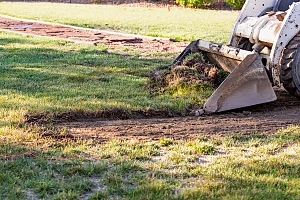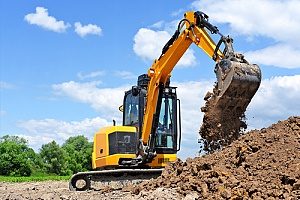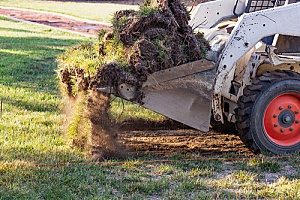 Whether you’re a seasoned construction professional, a budding landscape architect, or even a new homeowner looking to transform your hilly backyard, it is important to understand how to land grade on a slope effectively.
Whether you’re a seasoned construction professional, a budding landscape architect, or even a new homeowner looking to transform your hilly backyard, it is important to understand how to land grade on a slope effectively.
Land grading on slopes is a process that ensures stability, prevents erosion, and enhances the natural beauty of the terrain.
We’ll explore the essential principles of grading, including assessing soil types, understanding slope ratios, and implementing erosion control measures.
On top of this, we’ll also provide practical tips and innovative techniques for tackling various slope grades, whether you’re looking to create a serene garden landscape or preparing a site for construction.
From the initial site analysis to the final touches of landscaping, each step is pivotal in achieving a harmonious balance between human needs and the natural contours of the land.
Keep reading to learn more about the land grading process and why it’s so essential for effective soil drainage and the long-term health of your property.
The Importance of Land Grading
Effective land grading is vital for any property, especially when considering the impact of water drainage on the stability and safety of a home. In areas where the terrain is not naturally conducive to good drainage, proactive measures in slope and land grading are essential to prevent flooding and still water.
Slope and Its Importance in Drainage
The slope of your property plays a pivotal role in managing water runoff, especially during adverse weather conditions like rain storms or snowmelts. The aim here is to establish a downhill flow, ensuring water doesn’t pool or stagnate in flat areas of your lawn.
A well-designed slope facilitates a natural path for water to move away from your home, preventing potential flooding and water damage. For effective drainage, each home should have a slope leading away from the foundation.
Typically, a property should maintain a slope of about 5%, translating to a drop of 6 inches over a 10-foot distance from the foundation, which is often sufficient to guide water away from the house to reduce the risk of foundation damage and flooding.
Shaping the Land for Drainage
 Grading involves modifying the land’s contour to create the necessary slope for efficient water drainage, and this process often requires heavy machinery and professional assessment to determine the optimal slope that diverts water away from your foundation. Proper grading is not just beneficial but essential for protecting your property, especially in wet climates.
Grading involves modifying the land’s contour to create the necessary slope for efficient water drainage, and this process often requires heavy machinery and professional assessment to determine the optimal slope that diverts water away from your foundation. Proper grading is not just beneficial but essential for protecting your property, especially in wet climates.
Assessing and Establishing the Needed Slope
Before you start re-grading, it’s important to assess the current slope of your land, which you can easily do using simple tools:
- Gathering Supplies: You’ll need string (at least 12 feet long), two stakes (labeled “A” and “B”), a string level, a hammer for the stakes, and a tape measure.
- Setting Up: Pound stake A into the ground near your foundation and tie the string around it at ground level. Extend the string 10 feet down the slope and attach it to stake B, ensuring the string is taut but adjustable.
- Leveling: Using the string level, adjust the string on stake B until it’s level. Measure the distance from the string on stake B to the ground.
- Analyzing Slope: If the measurement is 6 inches or more, your slope is adequate. If it’s less, you’ll need to re-grade the land.
Re-Grading for Adequate Slope
If your initial slope is insufficient for your drainage needs, you’ll need to add fill near the foundation and tamp it down to achieve the desired gradient that you’re looking for. After further adjusting the terrain, repeat the slope measurement process to ensure you’ve achieved the optimal slope.
Get a Professional Land Grader
While assessing the slope can be a DIY task, re-grading typically requires professional expertise to assist you. Professionals can accurately determine the best approach for your specific property, taking into account soil type, regional climate, and other environmental factors, and their expertise ensures the grading process is done efficiently, effectively, and safely.
Safety is an important concern, especially when working on steep slopes, so using the appropriate machinery for the slope gradient, wearing safety gear, and adhering to operating guidelines can prevent accidents. Additionally, ensuring the stability of the slope during and after grading protects both the workers and the environment.
Long-term Maintenance and Inspection
Post-grading, it’s essential to periodically inspect your slope and drainage system and check for any signs of erosion, especially after heavy rains or snow—doing so will help identify any potential issues before they become major problems, ensuring the longevity and safety of your property’s foundation.
Maintenance may involve reseeding areas where vegetation has not taken hold, repairing any damaged erosion control structures, and ensuring drainage systems remain unclogged and functional.
Get In Touch with the Northern Virginia Land Grading Experts
 Effective slope and land grading are not just essential for the aesthetic appeal of your property but are fundamental for its safety and longevity.
Effective slope and land grading are not just essential for the aesthetic appeal of your property but are fundamental for its safety and longevity.
Proper grading ensures that water drainage is managed efficiently, protecting your home from potential water damage and foundation issues. With the right slope and grading, you can enhance the value of your property while ensuring it remains a safe and stable environment for years to come.
If you recognize the importance of these measures and are ready to take the next step, Dirt Connections is here to help. With extensive experience in both residential and commercial land grading, their team of experts is equipped to handle all your grading needs, ensuring your property is both beautiful and structurally sound.
Don’t let improper drainage compromise the integrity of your home or business. Take action today by connecting with Dirt Connections. For those in Virginia, dial 1-703-940-9949, or if you’re in Maryland, call 1-301-691-3215. You can also visit them online to explore more about their services and how they can tailor their expertise to benefit your specific property needs.
Remember, a well-graded property isn’t just a wise investment to make; it’s your first line of defense against the elements and the potential erosion that comes with them. Reach out to Dirt Connections today and let them help set the foundation for a safer, more resilient property.
Summary

Dirt Connections was started with one goal in mind: providing quality residential and commercial construction services to clients on time and on budget. Reach out for more information on how we can support your next project.
For your convenience our estimates are free and by appointment. Call 703-940-9949 for a free estimate today!









































